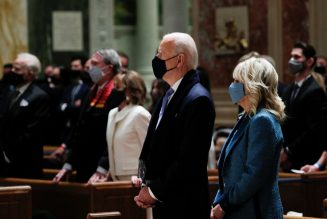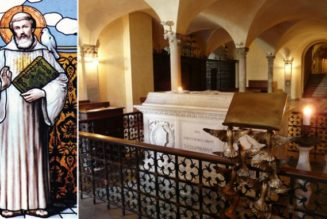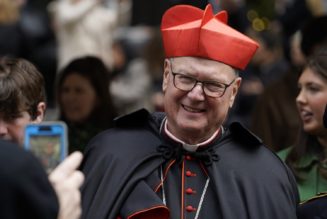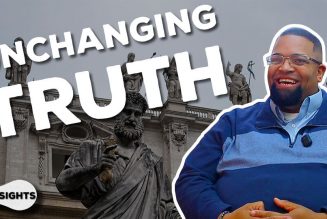
The Gospel readings at Mass continue, without skipping a verse, through the first hours of Jesus’s public ministry as told in the first chapter of St. Mark’s Gospel on the Fifth Sunday of Ordinary Time Year B.
By watching what Jesus does, we see not only his priorities back then, but his priorities today — because the Second Person of the Trinity is someone whose priorities don’t change. And what are his priorities? First, gathering disciples (two Sundays ago); second, teaching in the house of worship (last Sunday); and third, entering into family life.
It is beautiful to see how Jesus interacts with Peter’s family.
After astonishing people there, “On leaving the synagogue, Jesus entered the house of Simon and Andrew with James and John.” There are several families intersecting here: The son of Mary is entering the home of two sons of Jonah and bringing with him two sons of Zebedee.
In other words, to break from the exciting pace he has been on, he seeks rest in the shelter of a family home. The matron of the two brothers’ house lays sick with a fever and Peter and Andrew “immediately told him about her.”
The scene shows the tender personal care of Jesus. In the synagogue, Jesus amazed everyone with his authority as he expelled a demon with the commanding voice of his divinity. Here, he heals a woman with his human touch: “He approached, grasped her hand, and lifted her up.” He raises her with a caring gesture, and her fever leaves her. She responds with generosity, providing hospitality in service to her guests.
Jesus acts in our day as he acted then: He wants to be a loving, healing presence in the heart of our families, the focal point that brings us together, inspiring us to care for each other. And he wants that for everyone, even those whose faith is weak. Mark chooses details very carefully: He points out that the mother in law of Peter “lay in bed with a fever,” choosing an image that suggests sleep, a biblical metaphor for a lapse of spiritual commitment.
There are people like that in our family — it might be most of the people in our family. This Gospel says to keep telling Jesus about them.
What’s Jesus’s next priority after spending time with a family? The sick.
Mark’s language beautifully describes the scene that unfolds. As soon as sunset comes, “they brought to him all who were ill or possessed by demons,” Mark says, and in his cinematic way adds a “drone shot” of the scene, saying, “The whole town was gathered at the door.”
Jesus is hard at work as the night falls, and Mark tells us, “He cured many who were sick with various diseases.”
You can imagine the news of the miracle healer spreading house to house, family to family, as everyone thinks of the person they know who needs the healing Jesus is capable of and spreads the word. Jesus obliges, serving them into the night.
Early the next morning the crowd starts forming again. But now, Jesus is missing. Peter leads a search party to find him, but when he finally does, Jesus says, “Let us go on to the nearby villages that I may preach there also.”
This is always the way with Jesus. We have one agenda for him; he has another. “For this purpose have I come,” he says. He healed us, but not so that we can comfortably enjoy him in the privacy of our own homes; he wants to reach the whole world, and he wants us to help.
That means preaching — his and ours.
In Sunday’s Gospel Jesus “went into their synagogues, preaching and driving out demons throughout the whole of Galilee.”
Jesus, the incarnate Word of God, has a message for all the nations, but Jesus, the carpenter’s son from Nazareth, is one human voice speaking in one synagogue at a time.
So Jesus recruits billions of voices to speak his words in billions of places. The Church insists: “The disciple of Christ must not only keep the faith and live on it, but also profess it, confidently bear witness to it, and spread it. … Service of and witness to the faith are necessary for salvation.”
In the Second Reading, St. Paul famously expresses this Christian obligation. “If I preach the gospel, this is no reason for me to boast, for an obligation has been imposed on me, and woe to me if I do not preach it!” he says.
Pope Francis updates that sentiment for lay people. “There is a kind of preaching which falls to each of us as a daily responsibility. It has to do with bringing the Gospel to the people we meet, whether they be our neighbors or complete strangers. This is the informal preaching which takes place in the middle of a conversation,” he says, and “in any place: on the street, in a city square, during work, on a journey.”
St. Paul says that in order to do this, we can’t disdain anyone. “I have made myself a slave to all so as to win over as many as possible,” he says.
He doesn’t want to be a preacher who is too learned for the common people to understand, and he doesn’t want to be a preacher who is too common for the learned people to appreciate. “I have become all things to all, to save at least some,” he says.
Paul also knows the job is urgent, because he knows that life is short and the nights are long.
The First Reading from Job sits at the background of all the other readings at Mass this Sunday.
Job is in full “woe-is-me!” mode, with good reason, covered with sores and bereft of family, complaining that man’s life is a drudgery; we are hirelings, slaves; and we experience both agonizing darkness and the rush of time. In a remarkable summing up of the paradox of life, he says, “The night drags on” and “my days are swifter than a weaver’s shuttle.”
We know exactly what he means. So often, life is an agonizing snail’s march toward certain doom — and just as often, life is whipping by us as we bob up and down in our daily work routine like a cog in a machine.
Jesus gives us his answer to this dilemma in this Gospel, and the answer he gives is: Sunday morning.
The timeline of the Gospel we are hearing goes like this: On Saturday morning, the Jewish Sabbath, Jesus teaches in the synagogue; on Saturday afternoon he heals in the home of Peter and Andrew; at sundown on Saturday, the house is overwhelmed by ailing people as soon as Sabbath laws allow them to ask for help.
But the next day, at sun-up Sunday morning, Jesus is nowhere to be found, because he is doing what we do on Sunday mornings: he “went off to a deserted place where he prayed.”
When Peter tracks him down and says, “Everyone is looking for you!” his words remind us of two Gospel scenes when people searched for Jesus. One is when his mother and father sought him as a boy and discovered him “Doing his Father’s business” in the Temple.
But the other scene it reminds us of is not only on a Sunday morning — it’s on the Sunday morning that came to define all Sunday mornings. After finding his tomb empty on Easter Sunday morning, Mary Magdalene is looking for him and says, “They have taken my Lord, and I don’t know where they have laid them.” Jesus answers her, saying, “Go to my brothers and tell them, ‘I am going to my Father and your Father, to my God and your God.’”
When Jesus is missing, you can always find at prayer, speaking the will of his Father and asking you to join him.
That’s where we find him this Sunday at Mass.
All the rest of the workweek, the nights are long and the days are short. But here on Sunday morning we find Jesus Christ himself ready to join us in our families and raise up as many people as he can.
We find him in the church, his place set apart for prayer, and then we go forward in the communion line, and experience his healing touch. He literally puts himself onto our tongue, as if to beg us to speak of him.
Then when Mass ends we hear him tell us what he told Peter: “Let us go on to the nearby villages that I can preach there also. For this purpose I have come.”
Or, in the words we hear: “Go forth the Mass is ended. Go in peace, glorifying the Lord by your life. Go and announce the Gospel of the Lord.”
He was glad to enter into our lives and the lives of our family, but after Mass it is time to move on. He invites us to join him and spread the word far and wide.
Image: United Design Galilee Road









